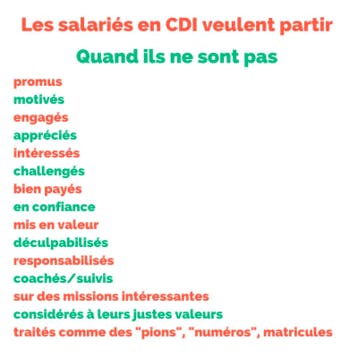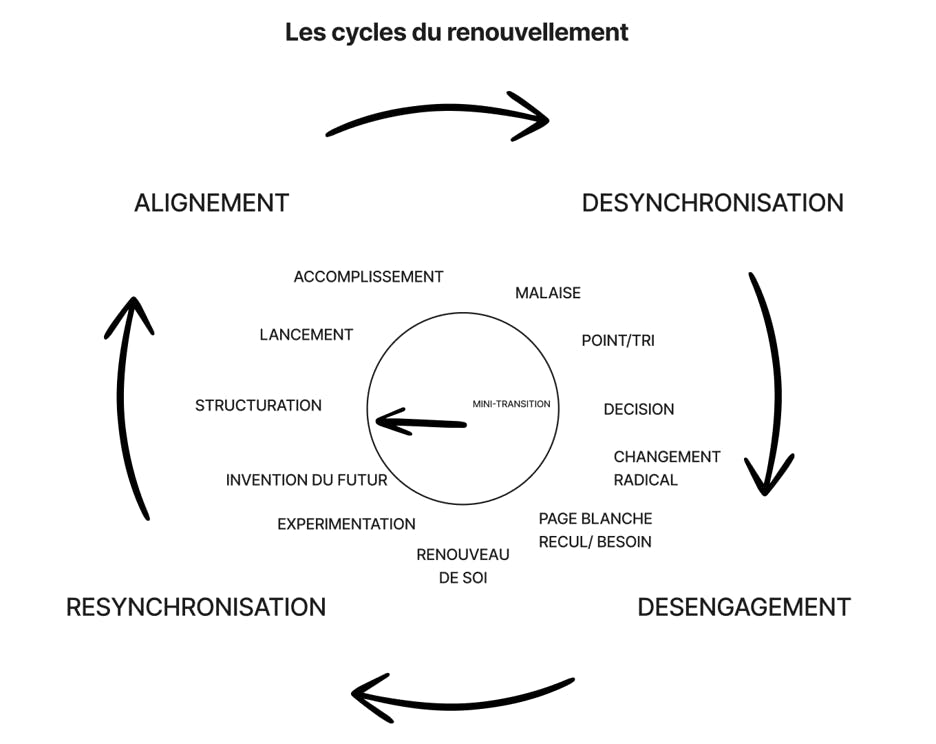Leaving... without quitting
How do you take the time to find your place?
74% of employees have seen a member of their team leave in the last 12 months.
On the other hand, 81% of managers feel they have enough training to help their teams grow*.
Work occupies 8 to 9 hours out of 15 hours of waking time from Monday to Friday, i.e. 60% of our week, and it is therefore legitimate to want to feel fulfilled and at one's place in one's job.
Beyond the numbers, the main reasons that generally push employees to leave their job are
- An unjustified refusal of a raise/bonus - compensation
- Disagreement with the company's strategy/policy - values
- A change of career direction - retraining
Not to mention the saddest part:
- The behavior of their manager

1/4 of employees do not leave because of the company, but because of bad management.
"You first break up with your manager before leaving your company" - Emilien, executive in reconversion
You quickly find yourself in a dead end:
- Lack of recognition - but you have to pay the bills
- Need for a change of scenery - but you have to make sure you have a financial cushion to leave
- Want to take your lumps - but no promise of a job
Why should it always be the ones who leave, the ones who quit, who have to pay the price and put their careers at risk? Are they at the origin of this toxic situation?
And as Bénédicte Tilloy (HR Director) says: "You can't solve the problems of well-being at work with afterwork parties, fruit baskets, yoga and table soccer.
The CDI is not a marriage contract
Obtaining a conventional rupture (RC) is undoubtedly more reassuring than resigning and jumping on the first job that comes along.
In addition to the severance pay, this system opens up the right to unemployment insurance, which makes it possible to calmly consider a period of transition - such as launching a project, taking a training course, or retraining in the SSE sector.
56,700€: that's what an employee with a permanent contract loses, over a 40-year career, by resigning, for example, at age 28, then at age 33, again at age 42, at age 50, or at age 56, because when we resign, we never receive severance pay. That's money left on the table.
So what's the point of accumulating seniority if you quit every time you change jobs?
When things are bad at work, resigning is seen as a relief - short-lived.
But it's a flight to safety, you have to find the next job quickly, and without asking too many questions, even if it means "lining up slides". But this dissonance (between the values, the need for usefulness & impact and the futility, even the harmfulness of some bullshitjobs) leads to an unhappiness at work that can lead to burn-out.
When will we be able to sit down? To take a look back, to know what meaning, what direction we want to give to our career, without being caught again in the hamster wheel of the "rat race"?
The solution through dialogue
We are conditioned - if a job no longer suits us, there are only 2 options
- Either we resign = escape
- Or we get fired = conflict
But it is possible to choose a 3rd way: convince your employer to let you go, it's the amicable divorce. But you have to know how to go about it. How to bring the matter to the table? How to have the right arguments? The right advice? The right strategy?
Because very often: "it's not the company's policy" "if you want to leave, just quit"
For this reason we have created a methodical and efficient path: MyWay “out”. Those who have followed it manage to get out of the professional impasse they were in. It is always possible to bring the employer to dialogue and to consider a separation.

Breaking up by mutual agreement allows those who obtain it to recover time, energy and money. These three elements combined are necessary conditions to find your place serenely, in coherence with your values and aspirations. When you are aligned with what you love to do, the results are incredible. It's obvious, because we are better at what we like.
Rediscover a social utility with an impact on society.
If people should not be encouraged to leave their jobs, they should not be encouraged to stay in jobs that make them unhappy. Some will say that unemployment insurance is meant to be in solidarity with others and not to benefit from them. If we want to last, we must be aligned with what we do, otherwise the risks to psychological health at work are very high.
Redistribution means that we contribute for ourselves and for others. With this system, each employee can try to choose a professional future that corresponds to him or her - in France we are lucky.
*Poll&Roll study for Heyteam, Oct 2022
** OECD statistics, Bac+3 and more



